Sep 2, 2025. Oceania Lecture Tour (4) Melbourne
Hello. Today marks the fourth stop of the Oceania lecture tour, where Sunim held a Dharma Q&A session for Korean expatriates in Melbourne.
After completing morning practice and meditation, Sunim had breakfast at the accommodation at 6 AM and departed for Brisbane Airport at 7 AM. As they traveled to the airport, the morning sun rose outside the car window.
Upon arriving at Brisbane Airport, Sunim bid farewell to the Brisbane Jungto Society members who had come to see him off.
“Thank you for the wonderful stay.” 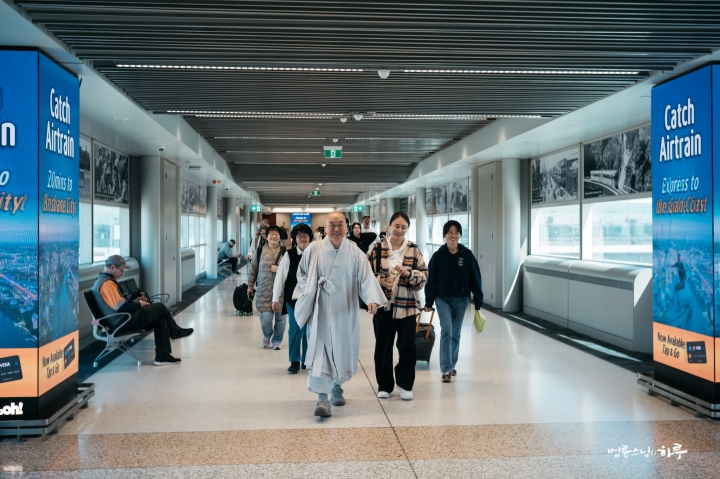
After expressing gratitude and taking a group photo together, Sunim headed to the boarding gate.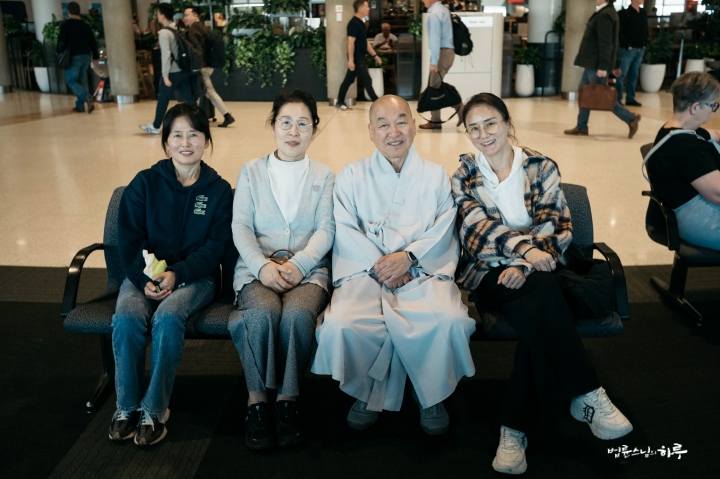
The flight departed Brisbane Airport at 10:05 AM and arrived at Melbourne Airport at 12:35 PM local time. After collecting luggage and exiting the airport, Melbourne Jungto Society members welcomed Sunim with a bouquet of flowers.
“Welcome to Melbourne!”
After warm greetings and a commemorative photo, they immediately headed to the accommodation.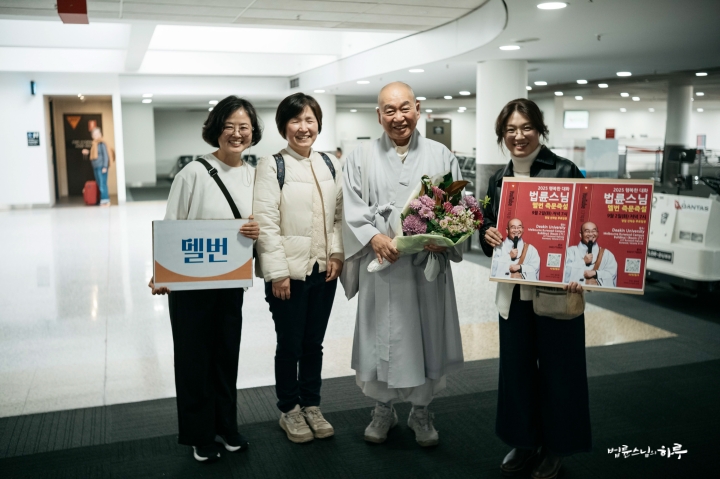
Arriving at the accommodation at 2 PM, Sunim had lunch and rested before departing for the lecture venue at 6:30 PM.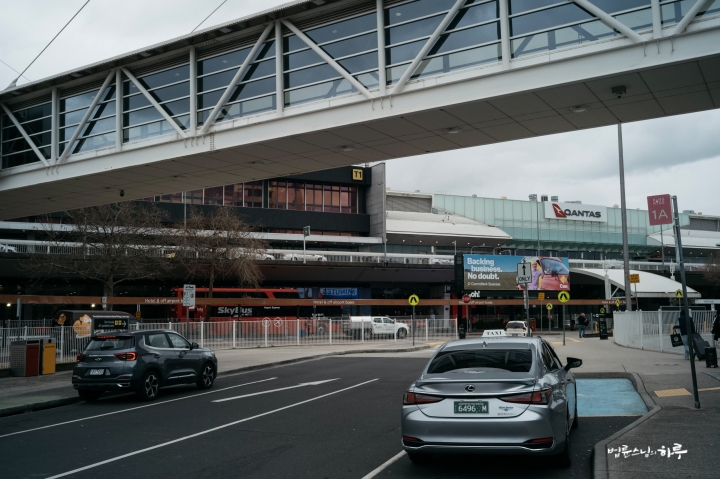
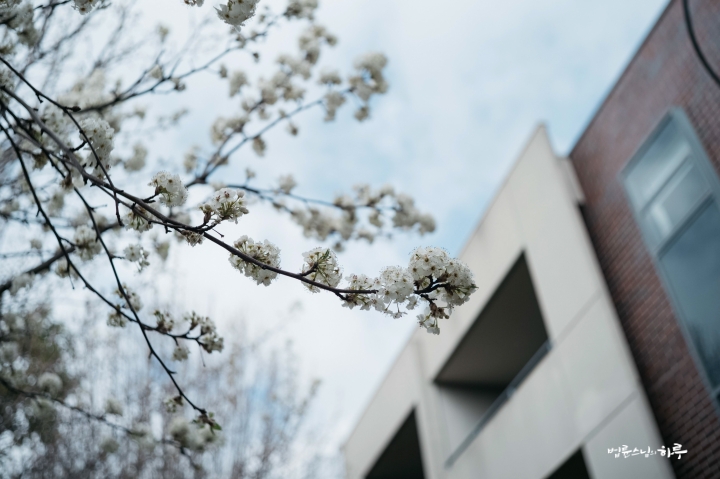
Today’s lecture was held in a lecture hall at Deakin University Melbourne Burwood Campus, located in Melbourne, Australia. This is one of the main teaching spaces at Deakin University situated on Burwood Highway, and today it hosted Venerable Pomnyun Sunim’s Dharma Q&A.
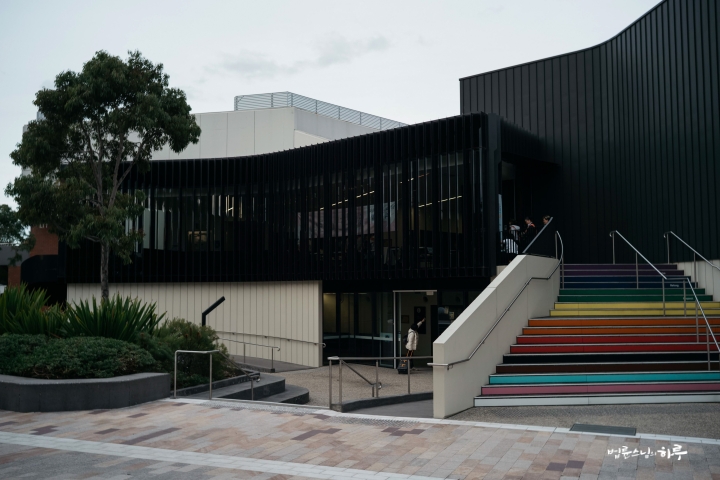
Upon arriving at the venue, volunteers were warmly welcoming the audience at various locations.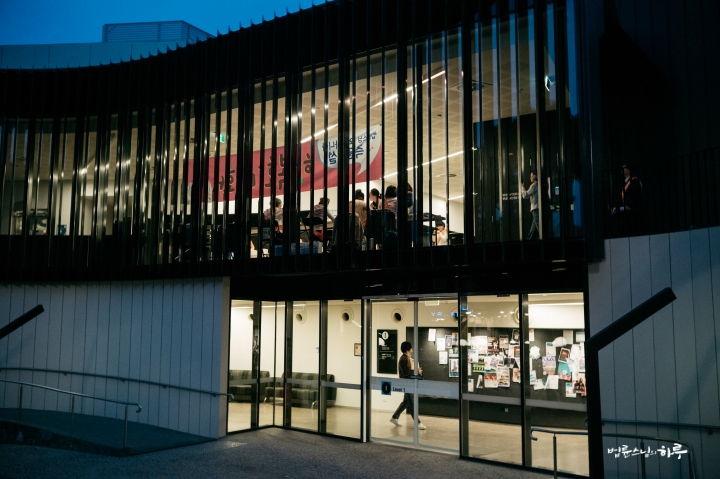
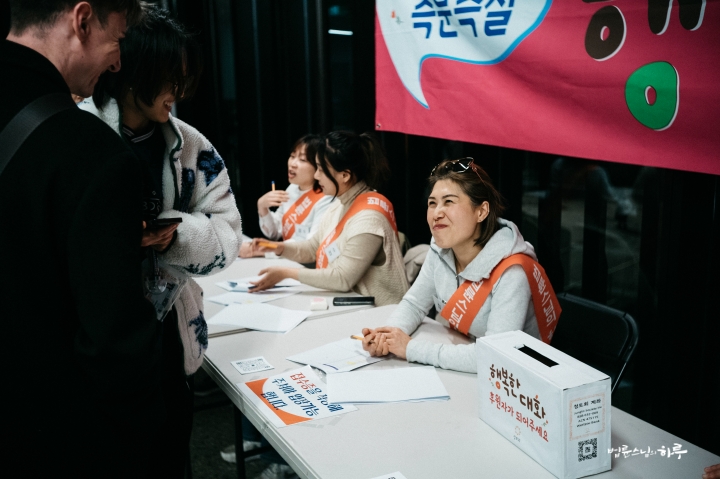
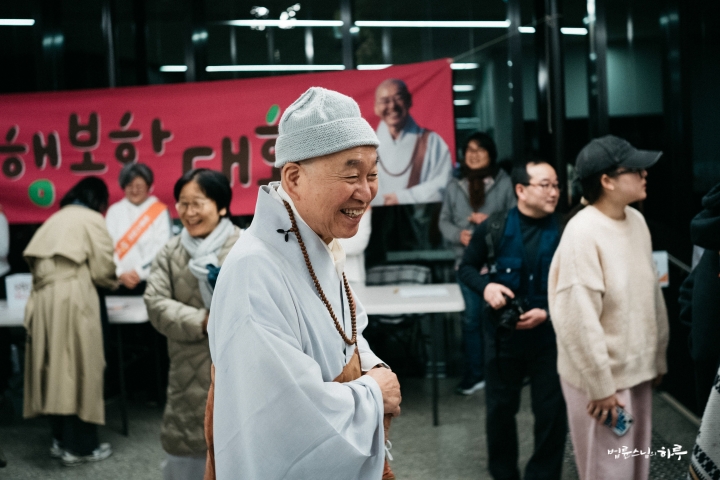
Soon it was 7 PM. With about 300 people seated, Sunim took the stage. Applause continued for a long time.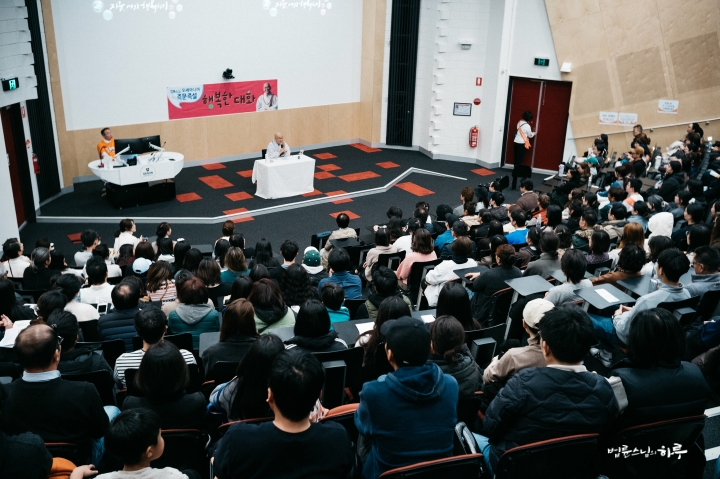
Sunim smiled and gave his opening remarks.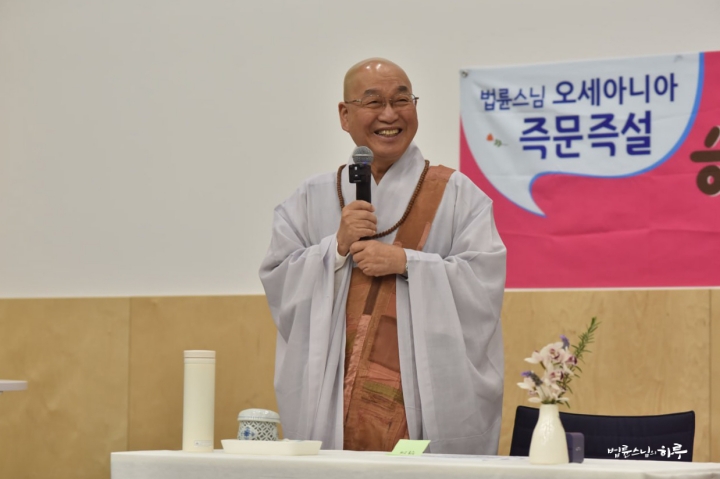
“As you may have seen in the news, Korea was quite hot this year. You’re fortunate to be in a cooler place. I heard Australia is in winter, but I didn’t prepare proper winter clothes and came only with summer clothes, so it’s been a bit chilly. Fortunately, it’s not as hot as Korea here, and the cold isn’t too severe either. Recently in Korea, there have been many instances where we’ve really felt the effects of climate change. The large wildfire in Gyeongsangbuk-do last winter was the first time I’ve seen such extensive damage in my lifetime. Flood damage has also occurred suddenly and locally, and the Gangneung area has experienced such severe drought that there’s a shortage of drinking water. It’s serious enough that a national disaster has been declared. While droughts and floods occurred in the past, nowadays they seem to happen more frequently and on a larger scale.
The Climate Crisis Is Everyone’s Responsibility
To prevent this climate crisis, we need to move toward a lifestyle that reduces consumption and uses less energy. However, human habits tend to pursue convenience and resist returning to inconvenience. Often, we fail to solve problems even when we know the dangers. It’s like people with substance use disorder who ignore warnings and fall deeper into addiction. In these times, those of you living in good environments need to take more interest in the climate crisis and practice responsible living.”
Following this, Sunim engaged in dialogue with those who had submitted questions in advance, and finally took questions from the audience. During the two-hour session today, eight people asked Sunim questions. One person shared how verbal abuse and stress at work had broken their spirit to the point where they dreaded going to work, and asked Sunim for advice on how to steady their mind and remain unshaken in such situations.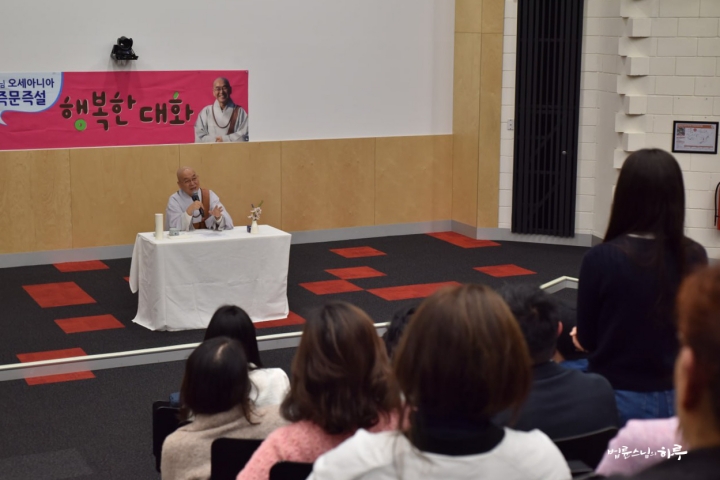
When Work Becomes Unbearable, How Can I Steady My Mind?
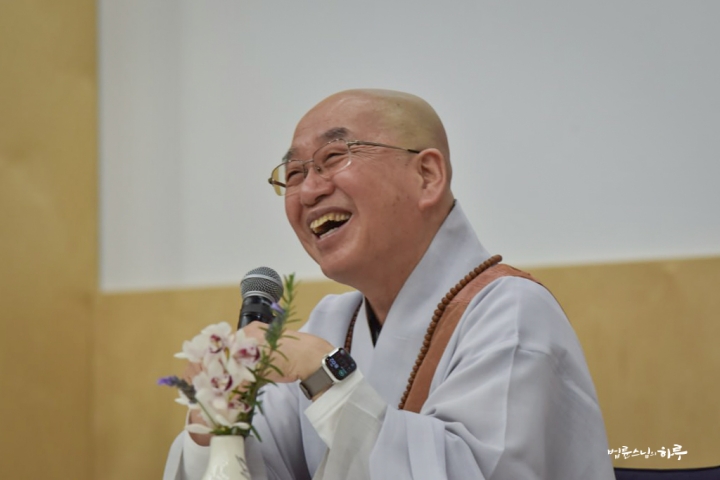
“Thinking about breaking your leg just to avoid going to work – that’s quite a foolish thought. The way to solve this problem is to take a leave of absence and try different work. For instance, there are many jobs you could start today. Restaurant serving, cleaning, hotel housekeeping, or construction site assistance – these jobs are readily available. For emotionally demanding professions like nursing or teaching, simply taking a break and traveling won’t solve the problem. When you return, you’ll want to quit again within a few months. Instead, if you experience other jobs, you’ll reach a clear conclusion: either ‘nursing is better’ or ‘cleaning is actually better.’ This way, you’ll either find a reason to change careers or your commitment to your original profession will become stronger.
Every workplace has unreasonable supervisors or difficult people. Schools are the same. Sometimes students or parents make teachers’ lives difficult. In hospitals too, patients or guardians sometimes use abusive language. Patients are in pain, so they’re naturally sensitive and harsh with their words. Instead of thinking ‘Why are they like that?’ you need to shift your perspective to ‘How much pain must they be in to act that way?’
Even at construction sites, there are jobs women can do. Not carrying heavy loads, but simple tasks like holding guide signs to direct traffic. When I asked a Chinese woman working in Korea, she said the daily wage was 150,000 won. The minimum wage is higher than many other jobs. If you take a break from nursing and try construction work or cleaning, you’ll discover which job suits you better. If you find dealing with patients difficult and prefer waving guide signs, then change careers. Conversely, after experiencing other work, you might realize that nursing is a much more respected profession. Then you’ll think, ‘I was taking my good fortune for granted,’ and when you return to work, you won’t be shaken.
Most people don’t solve problems this way. They just take time off and travel. But traveling is easier than any job, so the same problems repeat. If work is hard, take leave and try different work. After about six months, you might think, ‘I can make a living doing anything, so why should I be tied to my major?’ Since there’s always work available, you can rest when it gets hard and live freely. There’s no reason to be tied to one workplace. People usually prefer permanent positions, but I actually think temporary work is better. You don’t have to stick to one workplace. You can experience various things. How long do we live anyway?
Marriage is the same. There’s no need to cry if your spouse leaves. If they leave, you get the opportunity to meet someone else. It’s not your responsibility that they left. So just say, ‘Oh, thank you. Goodbye.’ If living together becomes bothersome, you can live alone. Having more choices – that’s freedom. In the end, it’s a matter of perspective. 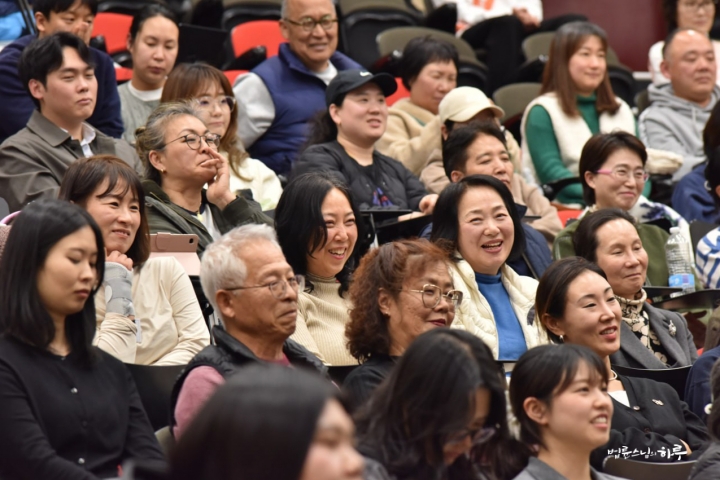
Wherever you go, there are unfair supervisors or difficult people. There are people who verbally abuse or interfere everywhere. This is especially true when dealing with patients. People who are physically ill tend to be irritable and speak harshly. If you think ‘patients speak harshly’ while working as a nurse, then you shouldn’t be a nurse. They’re stressed because they’re sick. I may just be giving injections, but patients can become irritable from pain. Sometimes you might miss the vein with the needle, and from the patient’s perspective, getting daily injections is painful, so they can’t help but get angry if you have to stick them again. In such cases, you can smile and say, ‘I’m sorry. Sometimes we make mistakes in life. Please understand,’ or ‘You must be feeling quite unwell.’ Just say this and move on.
Patients get irritated simply because they’re in pain. So when a patient gets irritated, you should think, ‘How much pain must they be in to act like that?’ What will you do? Will you take time off and try cleaning work, or will you just continue as you are?”
“Actually, I was planning to take a vacation and travel to Korea.”
“You were thinking of taking time off to travel? That won’t solve anything. You need to try work that you can do right away, like restaurant serving or cleaning, to know for sure whether your current job is right for you or if something else would be better. People who work with patients, like nurses, need to have the peace of mind to laugh off others’ irritability. Rather than getting angry at irritable patients, you need to have the mental space to pat them on the back and say, ‘You must be feeling quite unwell.'”
“Thank you.”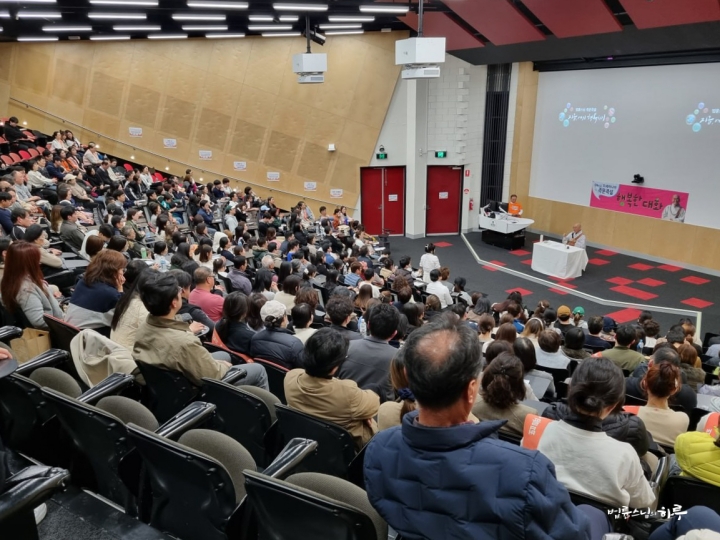
“In the past, teaching and nursing were preferred professions, but nowadays they’re becoming jobs people avoid. In the US, teaching became an avoided profession long ago, and in Korea too, teaching is becoming an increasingly difficult job. This is because parental interference is getting worse, and the burden of student guidance is growing. So when I lecture to teachers at education offices, when teachers talk about their ‘professional calling’ like nurses do, I say, ‘Don’t talk about calling. Don’t think about Pestalozzi or Hippocrates.’ Just work for what you’re paid. You can’t receive someone else’s money for free, so you need to earn your salary. Also, if you’re entrusted with someone else’s child, just don’t abuse them. Just let them play well and teach them roughly. How can a teacher do what even mothers can’t do? They entrust one child they can’t handle to school, so how can a teacher take care of twenty such children? That’s an ambitious dream. By leaving them be and approaching without stress, you actually help the children more. If you stress yourself trying to do well, you become a bad teacher instead.
When you think back to elementary and middle school, which teachers do you remember, those who taught well or those who treated you warmly? How well could teachers who hit students to make them study have taught? Rather, we remember teachers who played with children and cared for them warmly. So don’t keep saying ‘sense of mission, sense of mission.’ Just approach it with a light heart, thinking ‘I’m making a living while helping sick people a little.'”
“I understand well.”
Questions continued one after another. When asked if anyone else wanted to ask questions on the spot, several people raised their hands.
I have an impatient personality and feel guilty and sorry that my children seem to be taking after me. I try to practice changing but can’t. What mindset should I have?
When I look at my 11-month-old baby, I wish they could be happy in my arms without suffering when they grow up. Is this feeling because I don’t see my child as an independent being but as myself?
After living abroad for a long time, I find being alone comfortable, but sometimes I feel emotionally lonely. How can I balance loneliness and independence?
I run a kindergarten. To protect children, how can I recognize child sexual predators in advance and avoid hiring them?
Many thoughts and emotions pass through me like a hurricane. Can humans reach a state where they can control themselves through wisdom and practice?
What comfort and strength can I give to my father who attempted suicide due to depression?
As the conversation was coming to an end, the last questioner asked Sunim for advice on what mindset to have going forward, saying they felt angry at a scammer who took advantage of their desperate situation.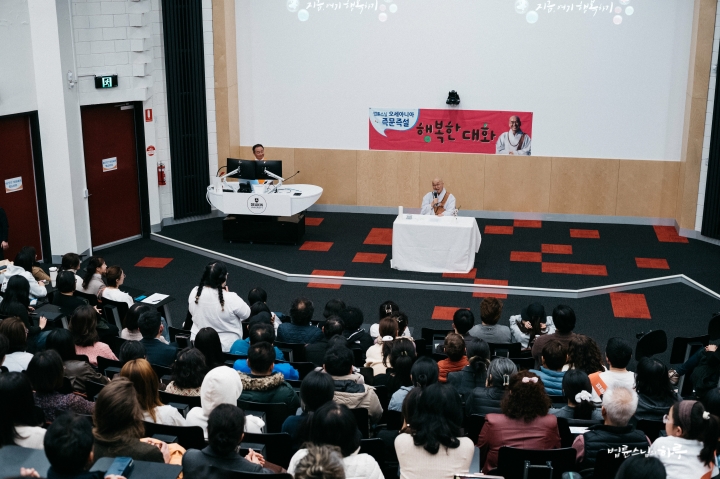
I Was Deceived by a Scammer and Even Signed a Contract. I’m Filled with Anger
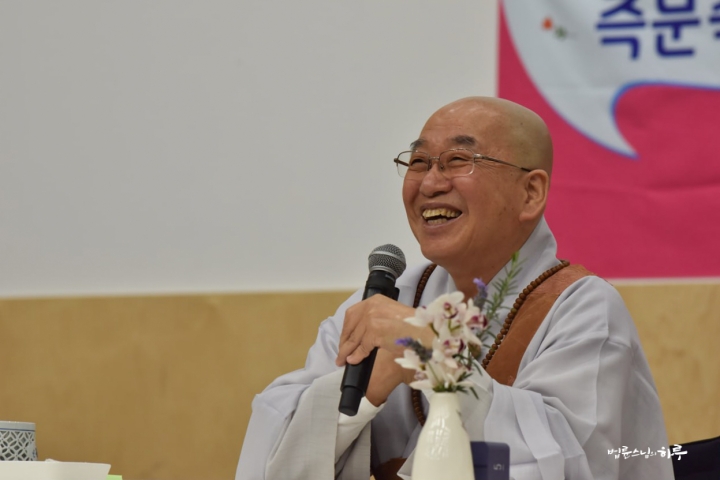
“Think of it as tuition. That person’s skill in deceiving you was remarkable, wasn’t it? If they could deceive someone as smart as you, accept that such a cost is worth paying.
Everyone easily falls for things they’re curious about. If you need money, you’re moved by money. If you need status, you’re moved by status. This experience becomes an opportunity to realize that you had such tendencies within yourself. When you bring a magnet close, nails stick to it but wooden blocks don’t. Similarly, you can see that there’s a nail inside you that your mind sticks to. Not all fish bite just because you throw bait. People are the same. You only get deceived when the conditions are right. Through this process, we come to realize under what conditions we’re easily deceived.
Especially when people are in difficult situations or have many desires, they’re easier to deceive. Money works on the poor, and honey traps work on those with desires. Just as you need to know someone’s preferences to approach them, this big loss ultimately becomes an opportunity to realize that you too can be deceived at any time. That’s why I called it tuition. If you’ve paid such tuition, then from now on, you just need to not fall for similar things until you die. Looking back after time passes, you’ll realize that cost was actually a great lesson. At first it feels like debt, but it can eventually become an asset. However, if you keep obsessing over it, it remains a wound. If you distrust or hate people and blame yourself, past events will interfere with your future life. The first person to hurt me was that person, but what’s hurting me now isn’t that person. I’m continuing to harm myself. It’s foolish.
Suppose a woman was kidnapped and forcibly injected with drugs. After a year of injections, she’d become addicted. Even if the police rescue her, her body is already in an addicted state. If she later takes drugs, she’ll be punished. Even though it didn’t start by free will, the punishment ultimately falls on that person. Similarly, because the wound that person gave has now become your own, the more you resent, the bigger the wound grows. When they call, you should be able to laugh and say, ‘Thanks to you, I gained great enlightenment. I learned that your smile is poison.’
If you can’t control your anger and distrust the world because of this incident, past wounds will harm your entire future life. This wound isn’t made by that person anymore. Now you’re making it yourself. Don’t blame yourself thinking ‘I was foolish.’ Think of it this way instead.
‘I paid good tuition. That person’s deception was really clever. I should help people through counseling so they don’t fall for such people in the future.’ 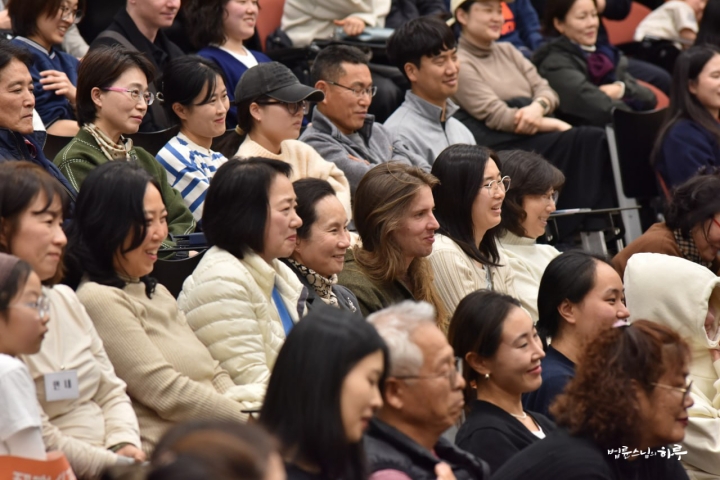
One of the reasons you come to talk with me is probably because you want to overcome difficulties. However, if the emptiness in your heart isn’t resolved, you can easily fall into things like fraud or drugs. When your heart feels empty, you buy luxury goods, drink alcohol, smoke cigarettes, and even do drugs. When people feel incomplete, they try to raise their status, make more money, or show off through fancy clothes or knowledge. Sometimes they even borrow the status or authority of someone they know to promote themselves. All of these behaviors stem from inner emptiness.
In Korea right now, who do you think is the easiest target for economic fraud? It’s people retiring from high positions. At age sixty, after retirement when their position has disappeared, if they receive an offer that promises a position and income to soothe their emptiness, they often hand over their entire retirement fund. From a scammer’s perspective, these people are the easiest to deceive. With just a little approach, they’re quickly hooked. The more difficult a person’s situation, the easier they are to deceive because of their emptiness. So even though you’ve lost a lot of money, it’s better to think of it as ‘paying tuition for a lesson.'”
“Thank you. I understand well.”
After more than two hours since starting the lecture, Sunim concluded the dialogue. The lecture ended with loud applause.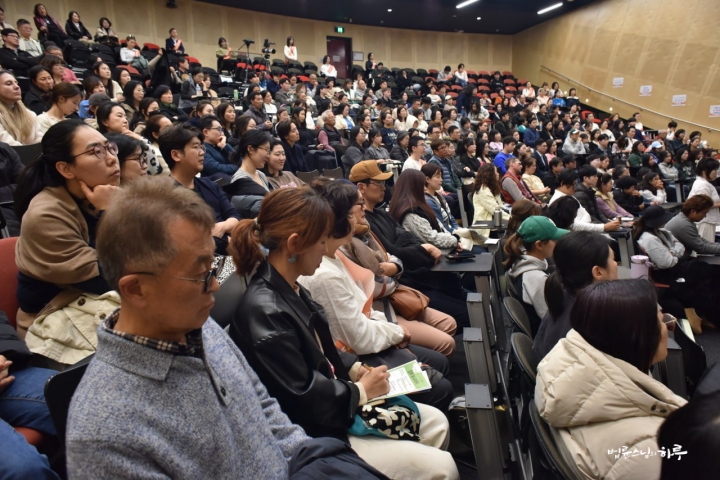
Immediately after, a book signing session was held. Many audience members formed a long line waiting for their turn. Many people expressed their gratitude, saying they had received much help from watching Sunim’s Dharma Q&A during difficult times.
“Thank you, Sunim. Please stay healthy for a long time.”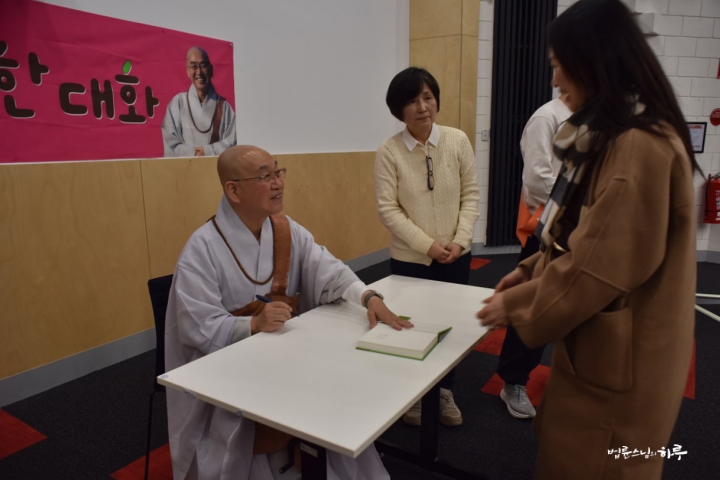
After the book signing, Sunim took a commemorative photo on stage with the volunteers who had prepared the lecture.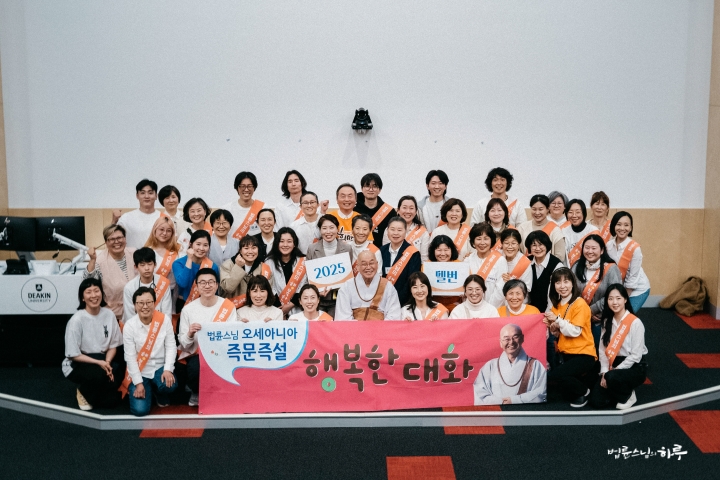
Sunim also presented his books as gifts to Song Eun-kyung and Eom Yun-hee, who were in charge of coordinating the lecture.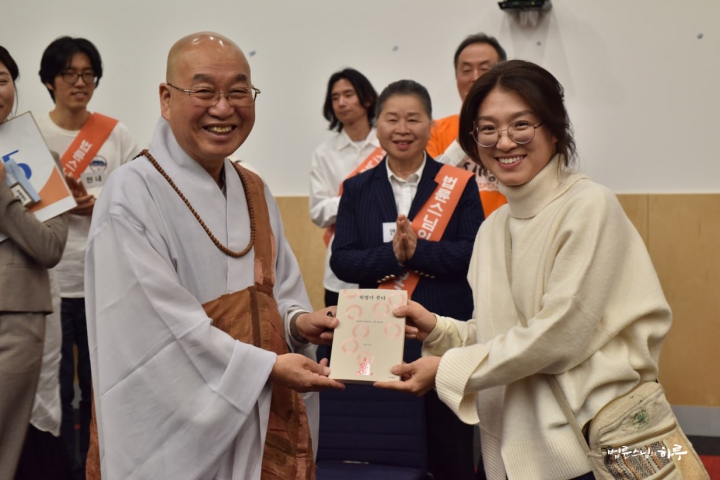
Sunim said goodbye to the volunteers and left the lecture hall.
“I’ll go ahead first. Please have a mindful sharing session with the Dharma Teacher.” 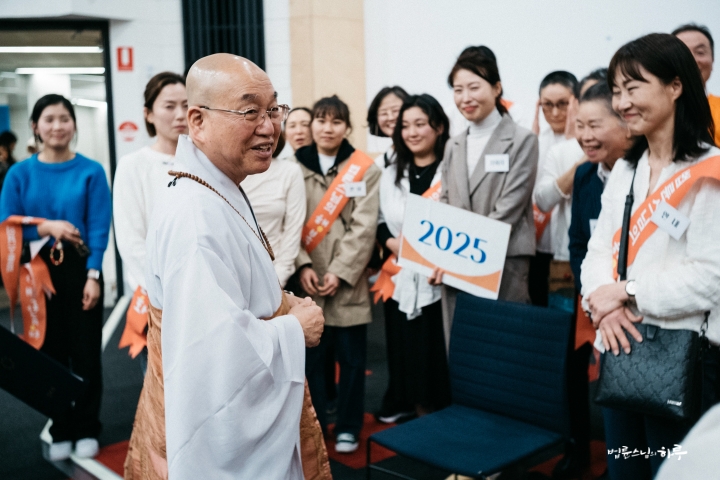
Sunim headed to his accommodation while the volunteers had a mindful sharing session with Dharma Teacher Myodeok.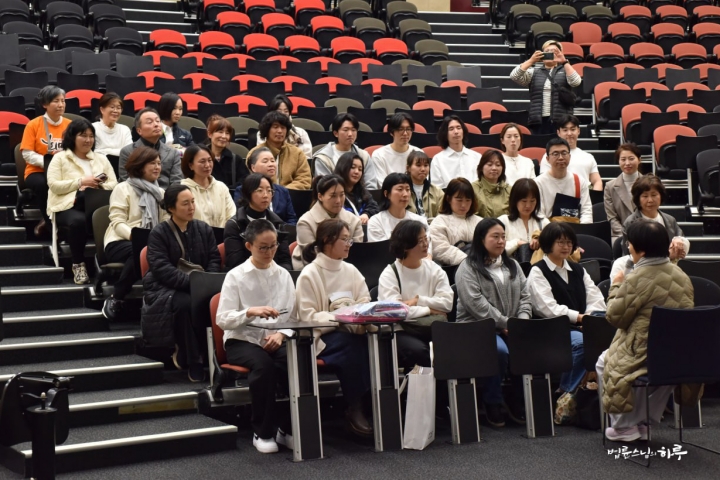
“I’m originally someone who really hates taking the lead, but this time I ended up being in charge of coordination. I was so grateful that my fellow practitioners filled in all my shortcomings. Thanks to the senior practitioners who guided me, I was able to find courage.”
“I remember putting up posters downtown when Sunim came in 2019. Back then, I couldn’t even properly ask ‘Can I put a poster here?’ But this time, while doing street promotion, I felt how much I’ve changed. I thought volunteering was for others, but it turned out to be for myself. That’s why I participated again this time.”
“I came to the lecture around this time last year and started the Buddhism Course. After completing the Sutra Course as well, today I’m here as a volunteer. I was so happy to meet in person the mother-like fellow practitioners I had only met online.”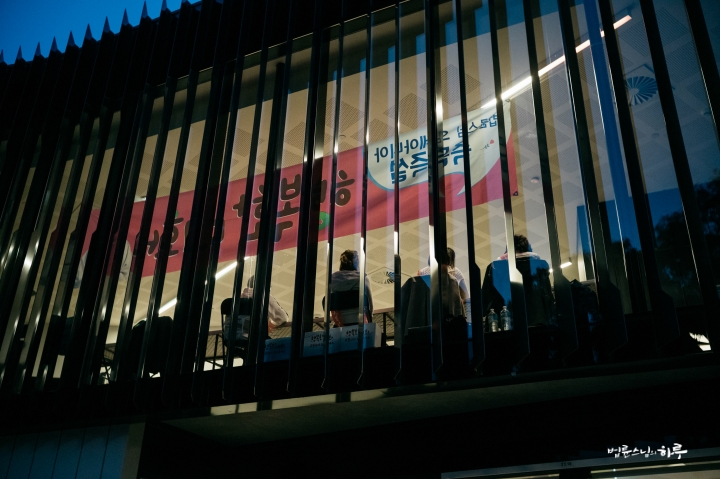
Sunim arrived at his accommodation at 10 PM and concluded his day.
Tomorrow, he will travel from Melbourne Airport to Perth Airport and continue with the fifth lecture of the Oceania lecture tour.





